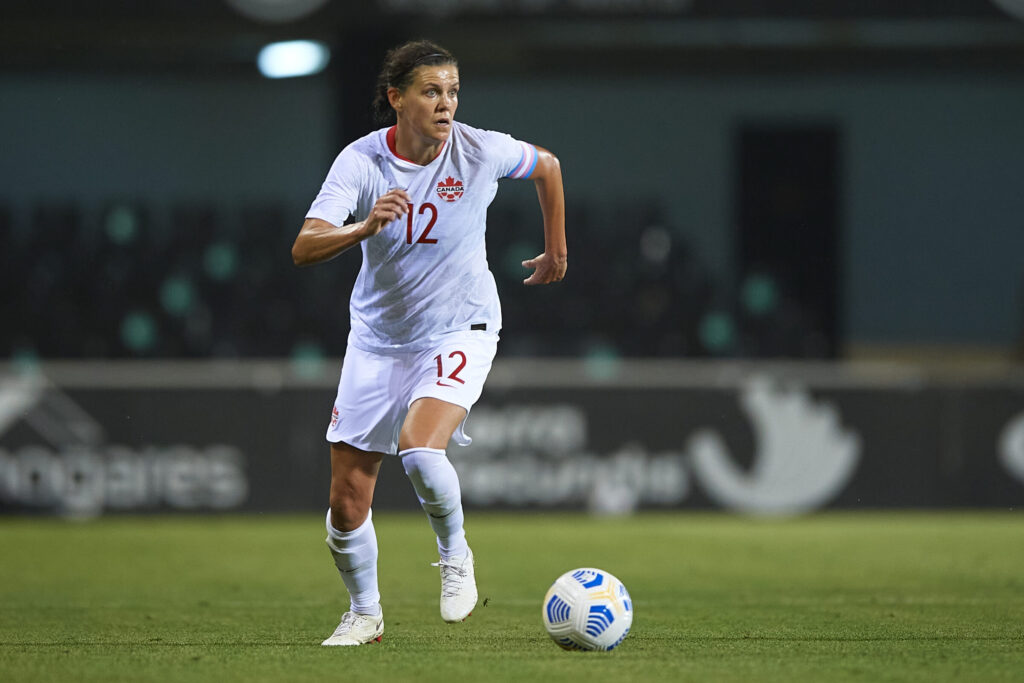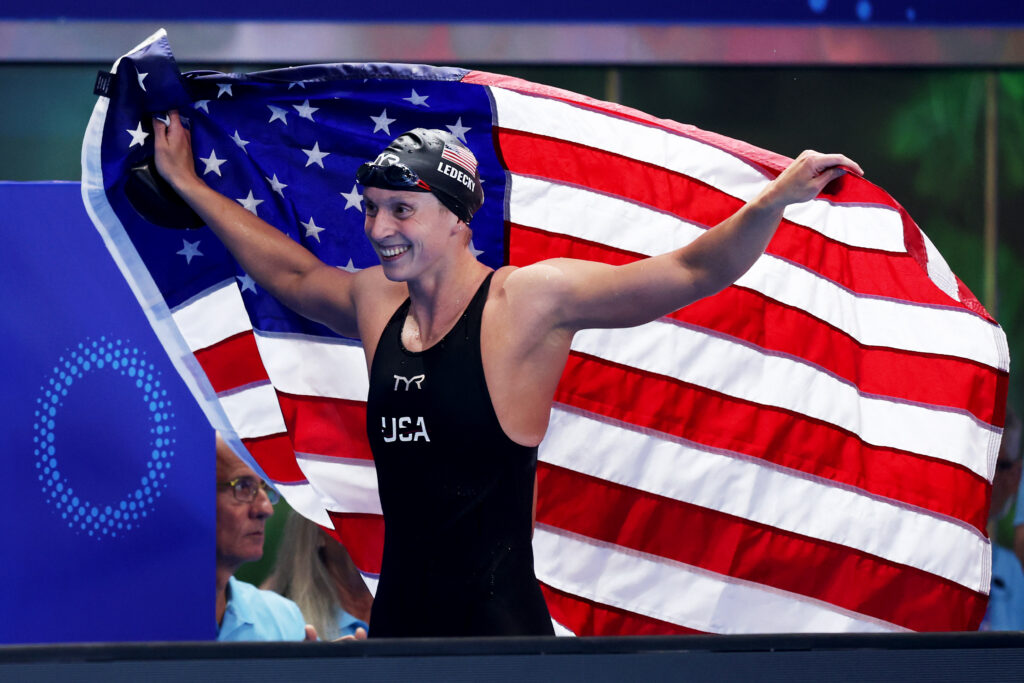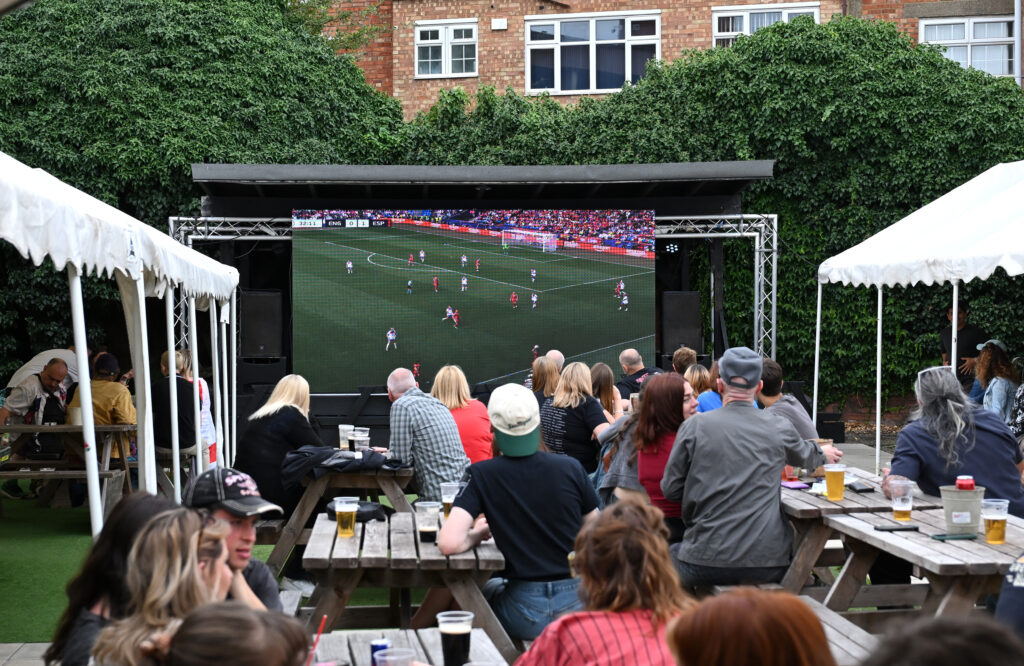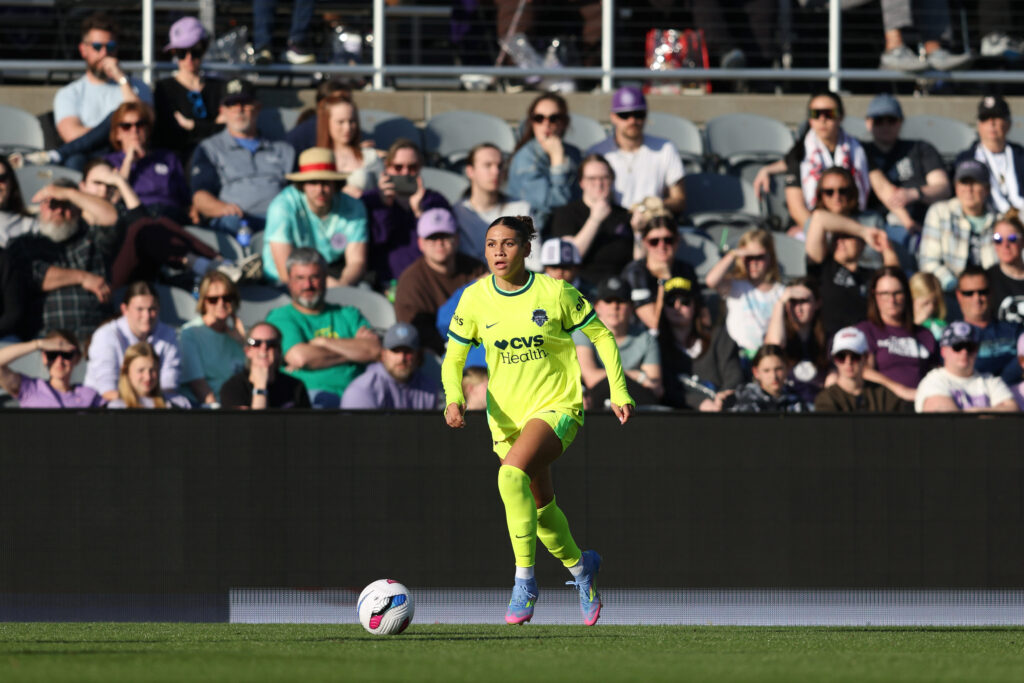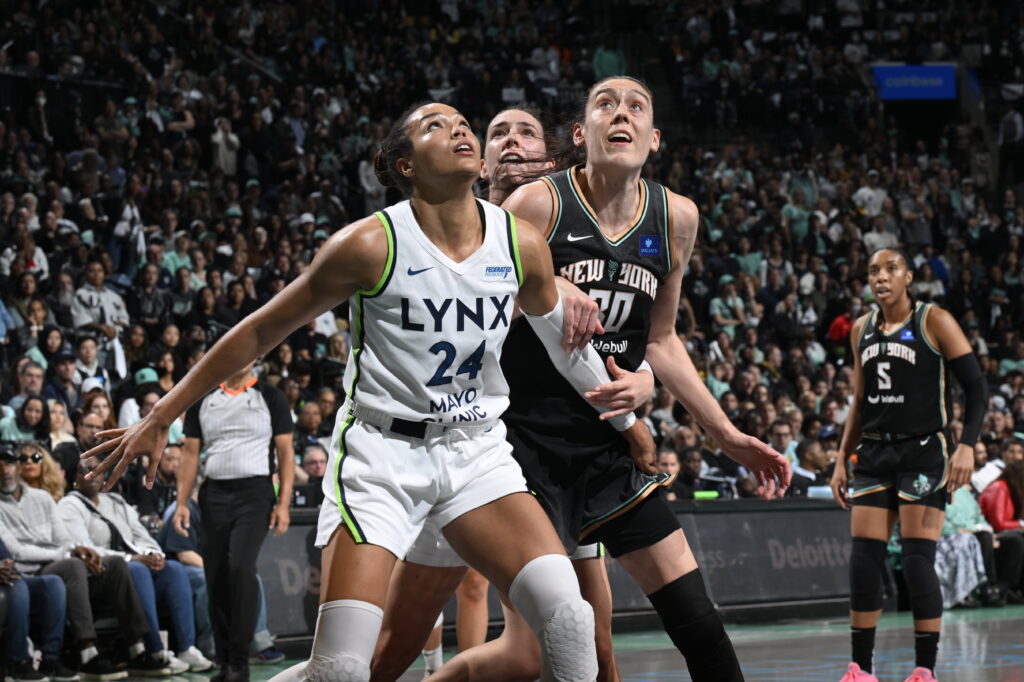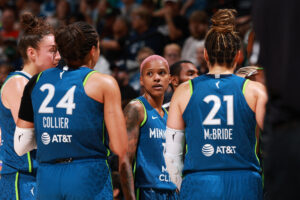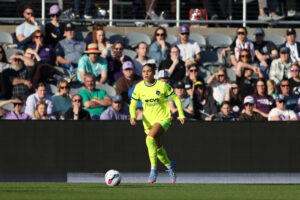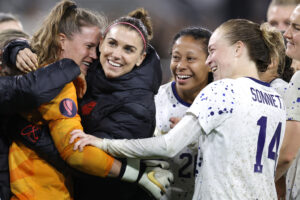Canadian women’s national team captain Christine Sinclair has always been private about her personal life. But now, after two decades in professional soccer and the all-time record for international goals, she’s ready to tell her story.
Sinclair’s memoir, “Playing the Long Game: A Memoir,” comes out Nov. 1, a mere three days after she plays in her fourth NWSL championship game with the Portland Thorns. The captain was a part of the Thorns when they won their first championship in 2013, the year the NWSL began, and on Saturday they’ll look to claim their third title against the Kansas City Current in Washington, D.C.
In her book, co-authored with Stephen Brunt, Sinclair discusses everything from growing up in Burnaby, B.C, to winning national championships at the University of Portland, to making Portland her permanent home with the Thorns. Through it all, she’s lost loved ones, helped Canada win its first Olympic gold medal in 2021 and pushed for equal pay between the men’s and women’s teams.
Just Women’s Sports sat down with Sinclair, 39, recently to discuss the writing process, reliving memories from her career and creating a better future for women’s soccer players.
I remember what I was doing 1 year ago……🇨🇦🥇 pic.twitter.com/h9AWXwKeKV
— Christine Sinclair (@sincy12) August 6, 2022
First, I have to ask, based on a revelation in your book: What was your favorite part of ballet class in college?
[Laughs] When it was over. I mean, easy credits … I needed an easy credit. It was like, “Ballet? OK.” A bunch of us took it and, like, oh my God.
Was there a specific moment or conversation that sparked the idea that now was the time to write and release a book?
It wasn’t a specific moment. Obviously it was after Tokyo, and opportunities are being thrown your way and it seemed like the right time. Our national team had never been at such a high, and it was people within Canada paying attention to the sport. It was just time to change the script. And young kids can now idolize women. I grew up idolizing male players and male figures, and what better time to change that? So, let’s do a book.
How long have you known that writing a memoir was something you wanted to do?
It’s actually been quite a while where, not that I wanted to do it necessarily, but whether it’s teammates or just people that I’d meet at [university] told me to write a book. I mean, obviously I’ve had a journey. I’ve had a career that has been pretty cool. So with help, it made sense.
As a naturally private person, how did you adjust to the writing process?
There are definitely certain things where, going into it with Stephen Brunt, I was like, these are off limits, these are no go’s. But yeah, it was just weird. For me, talking about soccer is easy. People who have followed my career know that we won gold, and know that this happened and this. It’s the little behind-the-scenes things that people don’t know of, which was cool. But for me, writing parts and putting parts about my family out there is … showing some vulnerability with that is the most difficult part for me, especially my parents and things like that. So that’s the part where you feel a little like, “Uhhh,” but that being said, I’m proud that it’s out there.
“Playing the Long Game” is dedicated to your biggest inspiration — your mother. How has she inspired and impacted you?
Obviously her living with MS for as long as she did, and being a kid, seeing one of your parents go through that and the struggles and seeing physically everything be taken away from her — the way she handled it inspired me and taught me a whole lot of perspective in life. And those days that I thought were so bad, in the grand scheme of things, are not bad at all. A lot of hard work and a lot of perspective and how to face things with a smile on your face, and trying to make the best out of situations that sometimes are very hard.
Many of your coaches had a big impact on you as well, especially former Canada women’s coach John Herdman. What did you learn from him?
He joked that he wants his players, when he’s done coaching them, to have a PhD in soccer. In terms of soccer knowledge and understanding the game, I’ve never had a better coach. I see the game and play the game differently because of him. But as a person, he is able to get the most out of every single individual on the team and that’s not necessarily on the soccer field. He prides himself on the individuals and the people that you are and you become. He’s just a good guy. I mean, he spoke at my dad’s service and he’s one of the few guys in my life where I count on him for anything. Very rarely do you get that in a coach. I’m so thankful that I had him as a coach and now as a friend, and seeing him take on the world with the men’s team, I’m his biggest fan.
As a captain, your lead-by-example style is just a part of who you are, but who has influenced your leadership along the way?
John definitely was the one that kind of challenged me the most in terms of, “OK, yes, you lead by example. Yes, you tend to do the right things day in and day out.” But he knows how to get you out of your comfort zone and try new things. He was the one that helped me find the power of my voice and when to speak up. And then having teammates like Diana Matheson and now bosses Rhian and Karina, they’re more upfront and honest and to-the-point type leaders, and they’ve definitely helped me find that within myself.
Thorns coach Rhian Wilkinson and GM Karina LeBlanc are two of your closest friends. How do you balance friendship and professional relationships with them in Portland?
It’s been a challenge at times, just because we are such good friends — best friends. Especially with Rhian and I, the coach-player dynamic, we’ve definitely set our boundaries that we are a player and coach and for right now, that’s it. I mean, that sounds so mean, but right now it’s, how can we help the Thorns win and succeed? With Karina, I don’t see her as much day to day, but it’s been cool to see her family and her little kid, Paris, down here. I know Rhian and Karina both played here for a year, but it’s cool to be on this journey with them and other staff members and slowly making this a little Team Canada down here. I’m proud of that. I like to think we’re good people and we’re building something special.
While writing this book, was there a moment or chapter that you had fun reliving, having not thought about it too much beforehand?
It’s not specific moments. I think of the 2015 World Cup, the 2011 World Cup, and in a way, leaving those tournaments, they left such a negative taste in my mouth because we weren’t as successful as we would have hoped. But then, years later reflecting back on it, there’s some great memories from those tournaments that, in the moment, you don’t think about because it’s wins or losses and that’s all that seems to matter. But looking back, there are moments that brought the team together. Without those two experiences, I don’t think we would have had the success we’ve had recently. It just brought the team closer and made friendships stronger.
Knowing how much Canadians love to beat the Americans, were you any more determined to break the international goal-scoring record knowing Abby Wambach (184 goals) held the title at the time?
So, as I was chasing Mia [Hamm] down and Abby down, it wasn’t so much that they were American. It was just as it got closer, it’s like you want it, and the pressure and stress that came with that. But now that it’s been taken care of, I’m more proud to see a Canadian at the top of the list and not an American flag. It wasn’t the driving force behind what I wanted to do, but now that it’s done, it’s pretty cool to see Canada on top.
You joke about Even Pellerud, a Norwegian, becoming more Canadian during his time coaching Canada from 1998-2008. It got me wondering, in your case, do you feel you’ve taken on any American tendencies while living and playing in the States for so long?
I mean, I don’t think so. But then I go home to Canada and my family makes fun of some of the things I say, and they’re like, “Oh, you sound American.” But that’s also why I like Portland so much. To me, it just reminds me of Vancouver. It has that vibe. It’s not like I’m living in Texas. So, I think I’ve stayed close to Canada.
Hypothetical question: If the NWSL were to expand to Vancouver, would you prefer to stay in Portland or move to Vancouver, which is closer to your hometown?
I’d stay in Portland. It was brought to me a couple years ago when the Whitecaps were dabbling in the potential of joining the NWSL. They were like, “Part of it would mean you would have to come back,” and I was like, “The Thorns are my club now.” Yeah, I couldn’t. I couldn’t leave. I’m not saying that, when I’m done playing, I wouldn’t venture up North to help out there, but in terms of playing, I’m pretty set here.
You mention in the book that you didn’t feel a lot of pressure on the field while growing up. Do you think you would have felt more pressure if you had been more aware of the opportunities that were at stake?
Maybe. I think of the younger kids now, that they’re just faced with different decisions than I was faced with. Do you go to college? Do you go straight to pro? Do you want to play in the U.S., or do you want to go overseas? They have different options and different pressures than I had when I was growing up. There was one path, pretty much.
But I think for me, what helped were my parents and my family. They never let it become bigger than what it was. They never let me live and die by how a soccer game went. I think they saw that I love the sport and they wanted it to be fun for me as much as they could. They allowed me to just grow up in that kind of world. There was no pressure. There was no stress. It was, for my brother and me, just doing what we loved. They didn’t put excess expectations on us or me, like, “Well, you know, there are college scouts at this game.” There was none of that. It was just, “Go do what you do because you love it. And whatever happens, happens.”
There’s still a lot of work that needs to be done to grow soccer in Canada. Obviously, there are calls for a domestic league, but what about the sport at the grassroots level needs to be improved?
I don’t know a lot about the inner-workings of youth soccer within Canada, besides my nieces’ experiences. I sense that there just needs to be more direction. More as John used to put it: We want players to succeed by design, not by chance. I thought that was actually very truthful and fitting for the way soccer is in Canada, where players are successful by chance, not necessarily by the inner-workings of clubs and the development of players. I don’t necessarily know how to fix that, but that’s just my observation. And it’s like, how many players have we lost along the way that have just fallen through the cracks?
Obviously, I see what’s happening here in the U.S., with the ECNL leagues and the regional leagues. They have such a foundation, and it’s designed for success and designed for growth. It’s been a long time since I’ve been in Canada and been with youth soccer in Canada, but that does seem to be lacking.
How do you feel the national team’s past battles have impacted the current fight for gender equality, and what do you want the future to look like for Canadian women’s soccer players?
There’s been a battle — I say battle, it’s not really a battle — with the Canadian Soccer Association. It’s been a constant struggle. Unfortunately, with the way FIFA operates, you need your men’s team to be successful to help fund your programming in terms of bonuses for qualifying for the World Cup. So, it’s just been a struggle to get from Canada Soccer what we as successful women’s players think we deserve.
However, now that our men’s team has qualified for the World Cup and Canada Soccer has come out publicly and said that our next CBA will be equal pay, it’s definitely a giant step in the right direction. We’re actually negotiating that right now. And I assume it’ll be done before the men’s World Cup starts. So yeah, I wish this was something that was in place 15, 20 years ago. But the veterans on the national team said that one of our goals is to leave the program in a better place. Hopefully this is one fight that our young players on the national team won’t have to have again, and that once there’s equal pay and equal compensation structures in place, there’s no going back from that. When it does get signed, that’ll be one of the things that a bunch of us are most proud of, and that future generations won’t have to have the same battles and struggles that we had.
Jessa Braun is a contributing writer at Just Women’s Sports covering the NWSL and USWNT. Follow her on Twitter @jessabraun.
